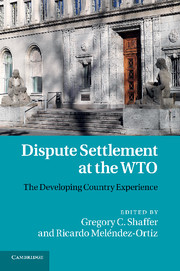Book contents
- Frontmatter
- Contents
- List of tables
- List of figures
- List of contributors
- Preface: The ICTSD dispute settlement project
- Introduction
- Part I Case Studies from South America
- 1 Winning at the WTO: the development of a trade policy community within Brazil
- 2 Argentina's experience with WTO dispute settlement: development of national capacity and the use of in-house lawyers
- Part II Case Studies from Asia
- Part III Case Studies from Africa
- 10 Conclusion
- Index
- References
1 - Winning at the WTO: the development of a trade policy community within Brazil
Published online by Cambridge University Press: 07 September 2011
- Frontmatter
- Contents
- List of tables
- List of figures
- List of contributors
- Preface: The ICTSD dispute settlement project
- Introduction
- Part I Case Studies from South America
- 1 Winning at the WTO: the development of a trade policy community within Brazil
- 2 Argentina's experience with WTO dispute settlement: development of national capacity and the use of in-house lawyers
- Part II Case Studies from Asia
- Part III Case Studies from Africa
- 10 Conclusion
- Index
- References
Summary
Introduction
Brazil is widely touted as one of the most successful users of the dispute settlement system of the World Trade Organization (WTO) among all countries, developing and developed, in terms of both the quantity of cases brought and the cases' systemic implications. Brazil has been the fourth most frequent complainant in the WTO dispute settlement system after the United States (US), European Union (EU), and Canada. It has won strategically important cases against the WTO's leading powers, and in particular in its agricultural subsidy cases against the US and EU. Its success before the WTO dispute settlement system has received national and international attention and has further motivated the government and private sector to engage actively in the Doha Round of WTO negotiations. The political payoffs for Brazil have been significant, helping it become a leader of developing countries in trade negotiations (the so-called G-20) and a member of a G-4 for trade negotiations in the Doha Round, consisting of the US, EU, Brazil, and India. As David Deese writes with respect to Brazilian and Indian leadership in the Doha Round, ‘[F]or the first time there was also a precedent set for shared structural leadership beyond the United States and the EU at the very heart of the international trade negotiating process’. For these reasons, Brazil is cited as a model for other developing countries, one with normative implications for our assessment of the WTO legal order.
- Type
- Chapter
- Information
- Dispute Settlement at the WTOThe Developing Country Experience, pp. 21 - 104Publisher: Cambridge University PressPrint publication year: 2010
References
- 7
- Cited by

